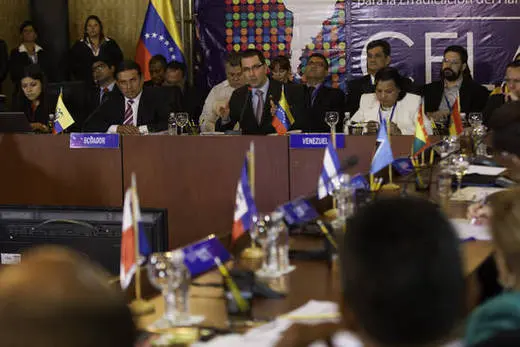The fourth summit of the Community of Latin American and Caribbean States (CELAC) concluded here Wednesday as leaders pledged regional unity to reduce poverty and bolster economic cooperation.
After a prolonged one-day meeting, 20 resolutions were adopted under the Quito Declaration. Delegations of the 33 member countries recognized the need to "strengthen unity and make binding agreements that allow members to go through difficult moments," said Ecuadorian President Rafael Correa as he completed the presidency of the CELAC.
Correa recognized that the region is going through tough times, with tumbling oil prices making it more difficult to generate jobs, reduce poverty and guarantee rights. However, "the will of our people and the unity of the region" are valuable resources, he said.
Correa admitted that the five pillars of "Agenda 2020," namely, "reducing poverty and inequality," "education, science, technology and innovation," "environment and climate change," "infrastructure and connectivity," and "financing for development," which were suggested at the last summit, have not been manifested in measurable goals or in a common agenda.
Regarding extreme poverty, he advocated convincing responses to inequality, policies to create a more egalitarian region and a progressive tax system to help reduce poverty.
"Poverty eradication is a moral imperative the region must achieve," said Ecuadorian Foreign Minister Ricardo Patino at the press conference after the summit.
Patino urged member countries to take steps with the view to creating a regional financial architecture so as to make the savings of Latin American and Caribbean countries remain in the region and finance their own development projects.
Venezuela's President Nicolas Maduro proposed creating a tactical anti-crisis economic plan in the region when addressing his CELAC counterparts at the meeting.
Maduro, whose oil-rich country is facing an acute economic crisis, said that under the new leadership of the Dominican Republic, which took over the rotating presidency of the group on Wednesday, the bloc should focus its efforts on economic issues this year.
In this regard, he asked the regional group to "consider making a tactical anti-crisis economic plan for Latin America and the Caribbean."
"It's time for a plan of solidarity, complementarity, sharing of Latin American and Caribbean development, it is time to prove, as we have done in politics," he said.
"CELAC should help lead our regional integration beyond tariff reduction and include, for example, services and investments," said Brazilian President Dilma Rousseff during her stay in Quito.
"We need to join forces to find answers to common challenges," she added and proposed that Brazil could share experiences in terms of social inclusivity.
The Dominican Republic's President Danilo Medina said he took over the political will to advance the common interests of the region, which seeks to combat poverty and inequality.
"We assume the Pro Tempore Presidency in a year in which the world and Latin America, in particular, face huge economic, social, ideological challenges and difficulties ...that only politics can resolve," he said.
Against this, he said the CELAC has the challenge of reorienting the forum to be a place for new ideas and strategies, not only for the region, but also for the world.
Medina said it's time to strengthen the presence of the bloc in international forums and continue to foster extra-regional relations with China and the European Union, among others.
Marco Bravo, president of Ecuador's Andes News Agency, told Xinhua that both Latin America and China are facing the pressure of an economic downturn due to the current weak global economic growth.
However, since the two economies are highly complementary, the two sides still have large room to expand cooperation in production capacity and speed up industrial upgrading.
Although Latin American countries differ greatly in economic development, Latin American governments and business communities agree that deepening cooperation with China helps to maintain a stable economy in Latin America.
 简体中文
简体中文

